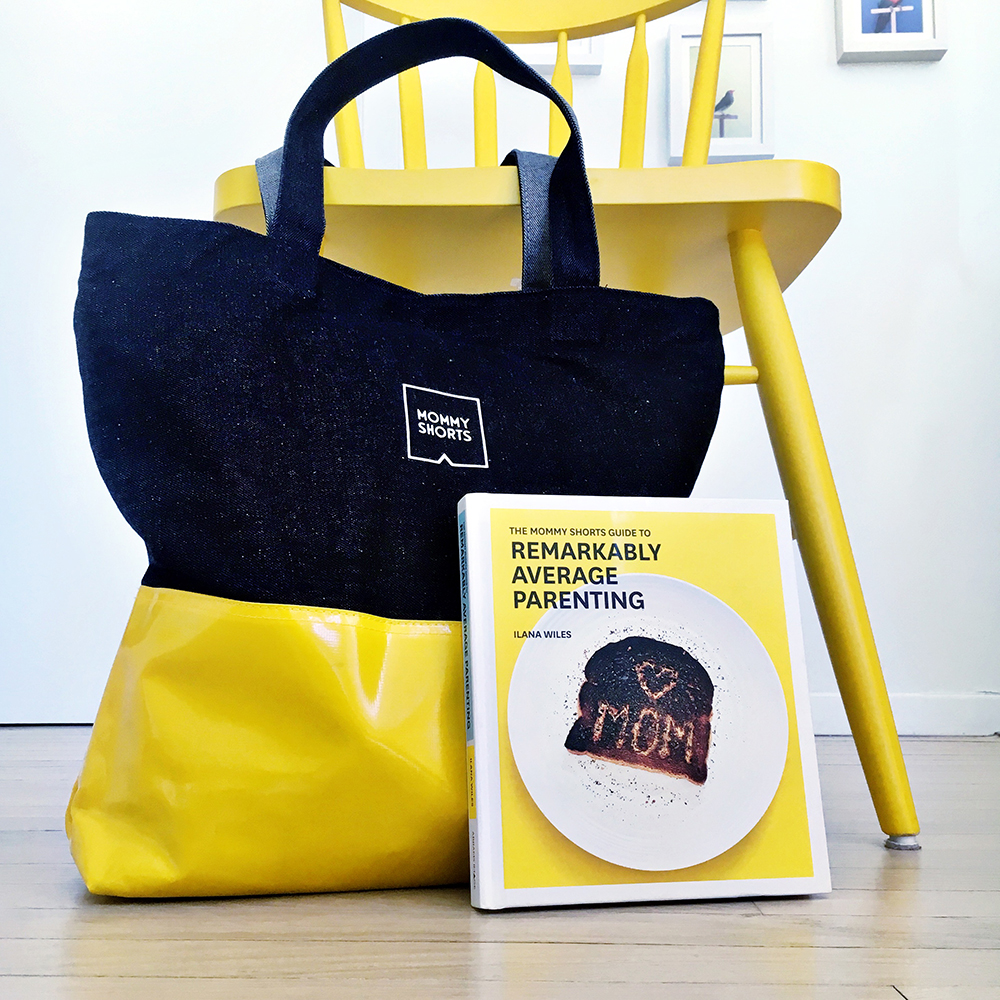 This week's early childhood development question for Dr. B comes from Wendy of The Pickles. Her super-needy four-year-old Angie wants to be around mom at all times. Wendy wants to know how to encourage independence and help Angie find a way to happily entertain herself. After all, how's a mom supposed to go to work/clean her bathtub/pour herself a proper drink when there's 35 extra pounds clinging to her leg?
This week's early childhood development question for Dr. B comes from Wendy of The Pickles. Her super-needy four-year-old Angie wants to be around mom at all times. Wendy wants to know how to encourage independence and help Angie find a way to happily entertain herself. After all, how's a mom supposed to go to work/clean her bathtub/pour herself a proper drink when there's 35 extra pounds clinging to her leg?
—————————–
Dear Dr. B,
My daughter just turned 4. She goes to school three days a week, spends the other two days with her grandparents and weekends at home with me and her dad. She's an only child and wants almost constant interaction – especially with mommy and grandma. She's clingy. She wants to sit on my lap almost constantly. Every sentence begins with "mom". She will entertain herself for short periods of time, but it drives her crazy if I try to work on my computer. If I go into her room and simply sit there, she will happily entertain herself. If I leave, she follows.
How do I encourage her to entertain herself more?
— Wendy
—————————-
Dear Wendy,
Clinginess is a natural reaction to feeling fearful or anxious about something. In young children, clinginess is often a sign of anxiety caused by being separated from a primary caregiver. It is also common for children to exhibit clinginess when things feel unpredictable due to changes occurring in their environment (e.g., entering school, change in caregivers or routine, new baby, divorce, or a death in the family).
Ten Tips To Help a Child Who Is Anxious and Clingy:
1) Do not ignore, overtly discourage, or punish clingy behavior: When young children exhibit clingy behavior, it is generally viewed as a positive sign that your child feels close and secure in your care and seeks you out for comfort when they are feeling distress. Responding to clingy behavior by ignoring or punishing it may make your child less likely to come to you when she is feeling scared or vulnerable.
2) Be responsive to your child’s needs and feelings: Try to identify what might be causing the clinginess and describe her feelings so she begins to understand it. For example, “You wish mommy could play with you right now. I wish I could play too but I have to do work. I promise to play with you when I’m finished.” By describing her feelings and expressing your own feelings of wanting to be there for her, she will feel understood and be less likely to need your physical presence as reassurance.
3) Increase predictability: Try to make things more predictable for your child by making the schedule or routine as concrete as possible. Although we know our children's schedule, they may not. Young children do not have a clear sense of time, live mostly in the here and now, and have shorter memory spans. Using pictures to depict their weekly schedule (especially when it changes every two to three days), telling them what to expect next, and reminding them when you will be available to spend time with them (e.g., "Remember, our special playtime is after dinner") will help reduce anxiety by bringing a sense of orderliness and structure to their day.
4) Build autonomy: Children build self-confidence through mastering new tasks and contributing to their environment in a helpful way. Create tasks that your child can help you with at home such as setting the table, cooking, or cleaning up their toys. The more confident a child feels in their abilities, the more secure they will feel in any environment.
5) Praise steps toward independence: Praise your child for tasks or activities that they are able to do independently (e.g., household chores, playing nicely on their own or with peers). Praising your child for doing things independently sends the message that they are capable of doing things for themselves and should feel confident without your close supervision and guidance.
6) Schedule special playtime: Some children feel a constant need for affection because they are unsure when or if the attention will be available. Schedule 5 to 10 minutes every day when you can provide your child with undivided attention (i.e., no computer, conversations with others, cell phones, or other distractions).
7) Separations and saying good-bye: Use a consistent phrase when saying goodbye. Be brief, do not linger, and do not overreact if your child gets upset after saying goodbye. Overreacting will only feed into her anxiety and make it worse, while lingering will increase the likelihood that she will continue to cry or seek your affection to prolong your stay each time.
8) Don’t sneak out when you leave: Some parents find it easier to sneak out when children have a hard time or throw a tantrum each time they leave. However, this will only increase your child’s anxiety and clinginess because they will be scared to engage in any activity too long for fear that you may sneak out and disappear at any moment.
9) Increase social activities: Socializing with children of the same age can help children develop attachments to their peers and can build social skills necessary for interacting with people outside of the immediate family. Set up regular play dates with a peer of your child’s choice from school or schedule a class or weekly trips to the park.
10) Stay with your child during social activities: Play with your child and their friends until they are comfortable playing on their own. Be available during play dates to teach and model social skills, respond to conflict, and monitor situations that may cause stress or anxiety.
Finally, clinginess is usually temporary and passes after children adjust to changes and develop skills to be more independent and interact with their peers. But if clinginess continues and leads to lengthy tantrums and resistant behavior when separated from parents and refusal to go to school or engage in social activities, you may want to consult a mental health specialist.
— Dr. B
Dr. B has a PHD in school psychology and specializes in early childhood development (ages 0-5). If you have a question for Dr. B, please email me at myshort@mommyshorts.com.

























Thanks for this Dr. B. I am currently experiencing extreme clinginess from my 18 month old toddler, since he stopped breastfeeding fully, and sleeping in his own bed and own room. I’m glad to see I’m doing most things right to help him be less clingy. Today we made progress when he did not cry when I left him at his grandparents place.
Good to know the same techniques can be applied to children of most young ages.
When saying goodbye, give your child something to look forward to when you will see her again, and to let her know that she will definitely see you again. Say something like “I’ll see you when I’m done working, after you do _______ with Grammy (or ‘after you take care of Grammy’). Then we will make dinner together, then put bubbles in the bath!” I also gave my daughter my watch (if you don’t have one, buy an inexpensive one, wear it for a while, and show her where the hands will be when she will see you again. “I will see you when the big hand is straight up, and the little hand is on the three.” I even drew a picture of the clock to show her what the watch will look like.
My daughter is a lot older and still wants to be within shouting distance of me, but over the years, we’ve been able to separate successfully because she knows she will see me again, and that she has purpose during her time away as well.
The routine of saying goodbye has helped alot. I make sure to always say the same phrase. But what i struggle with is a daily routine… especially during the summer! Something different is happening every day of every week! Can’t wait for preschool to start!
oh hey! this makes me feel like a win today! When I need to work on my computer (um, like right now) and it’s not nap, Eddie sits next to me and does some of his own “work”. Right now he is busy on his play laptop. Good times. although i think he hacked into my paypal account and spent it all on apple juice. jerk.
I feel like I could’ve written that letter even though my child is only 19 months. The clinginess and separation anxiety is at an all-time high right now. Filing this one away for future reference.
wow that’s good tips, Thanks for this Dr. B
My 5yr old is so clingy and so is my 18month old. It get a bit over whelming at times. Especially with my 5yr old who should be over this stage. But it makes sence from what I read since he just started kinder. Great tips.
This is a great article. My situation is a little different though, so I’m wondering if there is more to it for me. I have a 3 (almost 4) year old stepdaughter who is extremely clingy/attached to me, just like described above. We only have her on weekends, but when she’s with us, it is all about me – where I am, what I’m doing, etc. If I walk upstairs to use the bathroom, she follows…I’m literally never out of her sight.
I love her as if she were my own (I don’t have any biological children), but I feel like I’m doing her a disservice by fostering this attachment. However, because I am not her biological mother, I have a lot of anxiety/guilt when it comes to saying no to her or trying to create space. I fear I will undo our relationship, and since I’m NOT her biological mother, she might have more anxieties about my presence in her life and take it as a rejection or, on the other hand, get angry and reject me entirely as “payback.”
Can you expand this for stepparent-stepchildren relationships (specifically, is this just another stage of development, or does it have more to do with the nature of the step- relationship?) and if there are any different ways I should approach and handle the situation?
THANKS!
I’ve got a stage 4 clinger right now. I cannot be within 2 feet without him yelling for me. He sits outside the glass shower every morning and cries until I’m out. Should I wake him up before the shower and cuddle? It got to a point where I need to ignore him in order to get to work on time. He”ll be 3 in 2 weeks.
I have a 5 year old granddaughter, the past couple of weeks she will not go play in her room, she will not leave mommy or daddy’s site. She will not go to sleep by herself anymore, gets in her parents bed during the night. She is terrifed to go into any room anymore. Please help. She goes to daycare, she is in summer camp right now and loves it, she has been in the same daycare since she was a baby. But when she gets home she is really clingy.
im suffering from this extreme-clingy behaviour from my toddler of 20months old. i literally am unable to do anytthing on time as as soon as i get up, he insists on picking him up.. now as it is becoming difficult for me to keep him carried i really get frustrated at times and ignores his tantrums and keep working.it is also suffering me severely as i am a work-from-home mum and seems it impossible to work on time now. even at night as soon as i step out of my bed, exactly after 5 mins he starts crying for me …depressed, disturbed and sleepless…
Thanks Dr B, this is so informative and true.
My daughter 3 used to be very clingy but she is over it now. If we are patient and not overly irritated it will pass.
I have a four year old daughter and she is everything to me breaks my heart when she is so upset she is good as gold at home can do whatever I want at home and she don’t follow me at night time she won’t go to sleep unless I’m with her and in the middle of the night she will wake if she can’t feel me and if I’m at a friends place and she will not leave my site she will play with other kids for a bit at night sometimes day and we go outside just got 10 mins she ok with it but when she wants to she can really make me feel bad crying and saying I want to go home now please I said we are staying here tonight telling her that I’m staying with her I’m not going to leave u but no matter what I say she depends to go home and she goes to pre school two days a week and has been for two years and still cries when I leave I ask her why she cries when I leave her at school and she says I just want to be with you I love you through her four years she had plenty of sleep overs at ther nannas house and that just last couple weeks she has just wanted to come home if I’m at friends place and only sleeps if she feels me people say I have to be stronger and not let her get her own way and leave her to cry to sleep well I can’t do that it hurts to much seeing her in so much hurt
Where are the periods?!!
Thanks for ones marvelous posting! I certainly enjoyed reading it, you will be a great author.I will always bookmark your blog and
may come back very soon. I want to encourage you continue your great job,
have a nice afternoon!
We’ve enjoyable together with, produce I ran across just what I’m writing about to get. You may have finished the several time prolonged search for! Lord Thanks a lot guy. Have a very pleasant time. Ok bye
I’ve been surfing around on-line greater than a few working hours these days, but Irrrve never found virtually any fascinating content similar to your own. It really is quite amount plenty of for me personally Huy???t ??p th???p, t???t huy???t ??p, h??? huy???t ??p. In my opinion, in the event many web owners in addition to web owners made exceptional articles just like you does, the online world are going to be a lot more helpful than previously.
We are dealing a situation of clingyness here at home I would like to know if is just a phase. My stepdaughter has been ever since she was two spending some weekends with her dad, so she was used to being away fron her mom for some days but now she is 6 and for the last months she cries quite often saying that she miss her mom. Is this a normal child stage?
my 2 yr old is so clingy 24/7 I really need help how to solve this she won’t let me out of her sight, sleep in her bedroom, not even 5min to my self. she goes to day care and she is ok there. she won’t even spend time with her daddy for 5 min without seeking me…
[…] (Photo from mommyshorts.com) […]
I have read a hundred or so posts like this in hopes of figuring out how to deal with my superclingy daughter, age 3 years, 10 months. She runs up to me whenever I walk into a room she is in and hugs me and tries to pull me into an extended interaction. If I am sitting, she will immediately crawl in my lap and screams whenever I remove her or refuse to let her sit on me. She kisses me constantly – like over and over for 10 minutes straight, with these kissing sessions occurring 5-10 times a day. She also screams when I try to introduce any type of independence – like when I have tried to potty train her (the mere sight of or talk of potties or panties elicits screams – and none of it seems to stem from a bad experience, as I have generally given up after 5 minutes of trying to get her calm anyway so she hasn’t really had to train yet). On the other hand she is quite willing to play independently if she is set in the playroom by my husband while he cooks dinner or washes dishes. Until I leave my office of course. I am at my wits end. There have been no changes in our household – we have not moved or had new kids or anything, and I work from home so she sees me much more than most toddlers, so I can’t imagine it is a separation anxiety thing. Her life is totally predictable – aside from playschool on Tuesdays and Thursdays she spends every day at home and running errands with a stay-at-home dad. We have regular mealtimes and very rarely eat out. There is a set bedtime routine. Her sister gets home from school every day at the same time and plays with her for an hour or so. We have a regular cuddle and play session every morning. She plays well with other kids and seems well socialized. The advice given here is not necessarily bad, but since I am doing all of these things, and have since her birth, it is not really very helpful.
[…] – but it really is best to encourage them to go out and meet people as soon as possible, to stop them getting over-attached to you. Visit a local community center and introduce yourself and your family. Chances are, the staff will […]
Hi, do you allow guest posting on mommyshorts.com ? 🙂 Please let me know on my email
I am a grandparent, my son has shared custody he had a bad accident and has pwd he lives with us his ex got together with another man his ex and my son share custody of there daughter the new boyfriend has a daughter with my sons ex it is hard on my son he dose everything for his daughter now his daughter is calling the new boyfriend dad my son says nothing but I know it bothers him ,when my grandaughter visits we spend so much time interacting she never wants to go home ,it becomes difficult for everbody lately my grandaughter keeps saying she wants to live with us but we know she would miss her mum ,my granddaughters been complaining about her mum to me but I dont want to cause problems I just listen not sure why my grandaughter is so upset she clings to me like I am her mother I am not looking for this role but it’s happening how should we handle this.
Hello blogger, do you monetize your website ? There is easy
way to earn decent money every month, just search on youtube : How to
earn with wordai 4
I been reviewin online more than 2 hours today for painter jobs in calgary & 10 Ways To
Handle a Clingy Kid, yet I never found any interesting article like
yours. It’s pretty worth enough for me. In my view, if all webmasters and bloggers
made good content as you did, the web will be much more useful than ever before.
Hello,I read your new stuff named “10 Ways To Handle a Clingy Kid – Mommy Shorts” on a regular basis.Your story-telling style is witty, keep it up! And you can look our website about daily proxy.
[…] https://www.mommyshorts.com/2011/07/10-ways-to-encourage-independence.html […]
This is the biggest crock of shit ever lol. You moms are scared to enforce and discipline your kids. That’s why they act the way they do because they know there is no consequence for negative behavior. Clinginess is negative behavior that stems from not making your kids have their own life and teaching boundaries. Make em go play outside. Have them go to afterschool programs. If you tell them if they are around you, they are getting spanked, I promise they will leave. It doesnt psychologically screw a kid up to make them independent. You’re goal is to equip them to be as prepared as possible for adulthood…what good does it do to coddle them and continuously distract by changing the subject to get them to listen. Its avoiding confrontation. Appeasement doesnt help a kids character. Quite the opposite. Grow some balls. Dont be afraid to hurt your kids feelings in saying no or old fashioned discipline. Everybody would agree the older generations are much more respectable and driven people. This is why.
Well said.
I needed to read this. My 3 year old is extremely clingy. I attribute it to having his little brother so close in age.
My 6 year old is clingy. Has been from birth . Had him in his own bed at the summer time and now he’s back sleeping with me. He constantly wants to be with me and touch me . He puts my elbow to his chin every minute he can . Get up to go to the bathroom with me In the middle of the night . When I shower he waits on for he toilet floor for me. He shouts on me if I’m in a different room. Iv done 6 years I’m use to it now. But iv started a relationship up and it’s ok because he understands my child’s needs but I need a bit of space how do I disconnect from him .
Try to see this from your daughter’s perspective. How would you feel if your partner told you, “I can’t watch a movie with you right now, because I have to make dinner?” Or, “I don’t feel like going for a walk, because I am too tired?’
And just think. When she becomes a tween or teen, she will barely want you around, and you will be left wondering why she won’t spend enough time with you.